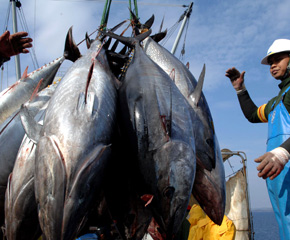Japanese demand for its fatty flesh to make sushi has sparked a fishing frenzy for the Atlantic bluefin tuna, a torpedo-shaped brute weighing up to half a tonne that can accelerate faster than a Porsche 911.
Now a system of corralling the fish into ‘tuna ranches’ has combined with a growing tuna fishing fleet to bring stocks dangerously close to collapse, warn scientists from ICCAT (International Commission for the Conservation on Atlantic Tunas), the body established by bluefin fishing countries to monitor the stock.
“There are plenty of signs that we might be seeing the start of the collapse,” said Susana Sainz, a fisheries officer with campaign group WWF.
The environmental impact would be catastrophic, she said: “The bluefin is a top predator so the whole ecology of the Mediterranean would be destabilised.”
Tuna has become a big business throughout the Mediterranean, and the lure of up to $15,000 for the best and biggest fish attracts dozens of new boats to the industry every year, many of which are controlled by Asian and Italian mafias, sources say.
“It’s over”
Over-exploitation, pollution and climate change have devastated many of the world’s commercial fish stocks and campaigners say the UN agreement to restore them by 2015 fails to set strong enough targets.
“It’s over, that’s my gut feeling from both a stock point of view and a business point of view,” said Roberto Mielgo Bregazzi, a fisheries consultant who set up the first ‘tuna ranches’ 10 years ago.
The ranches, giant underwater cages where freshly caught tuna are fattened on squid and sardines, have revolutionised the industry.
The innovation allows fishermen to scoop up shoals of spawning tuna, transfer them to the 50-metre-wide cages and return to fish until the last is caught.
Deep-frozen and shipped to Asia, the bulbous carcasses are sold in auction rooms like Tokyo’s Tsukiji market before the red meat is sold for up to $75 per 100 grams when served in the city’s best restaurants.
Dispute
Gerald Scott, the American chairman of ICCAT’s scientific committee, said he estimated just 6 percent of the original stock of Mediterranean bluefin remained.
For almost a decade, fishermen in the Mediterranean have smashed quotas, taking around 50 000 tonnes a year, says Scott.
Critics, including the United States, say European countries that control ICCAT (the International Commission for the Conservation of Atlantic Tuna), should take much responsibility for setting quotas at twice the level their own scientists recommend and failing to enforce them.
The Commission did take action last month, banning bluefin fishing for the rest of 2007 and threatening Greece, Malta, Portugal, Spain, Italy, France and Cyprus with court action if they could not prove they were not over-fishing.

